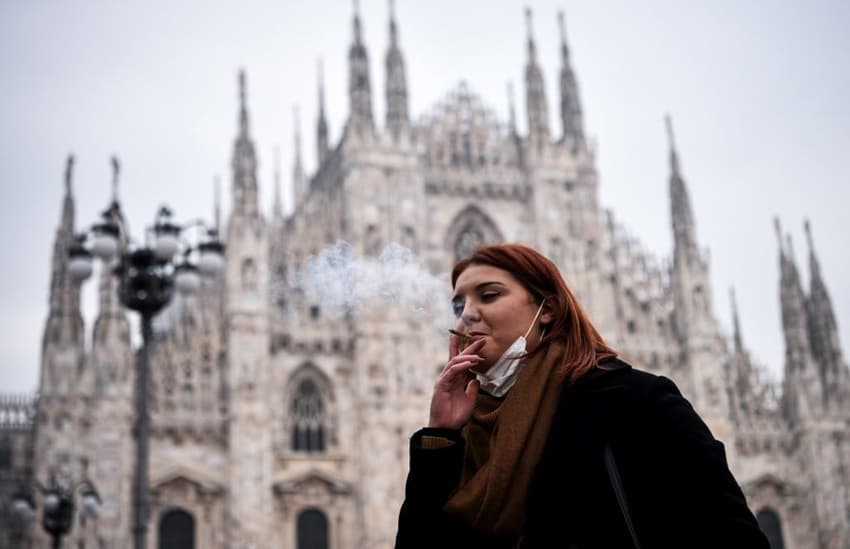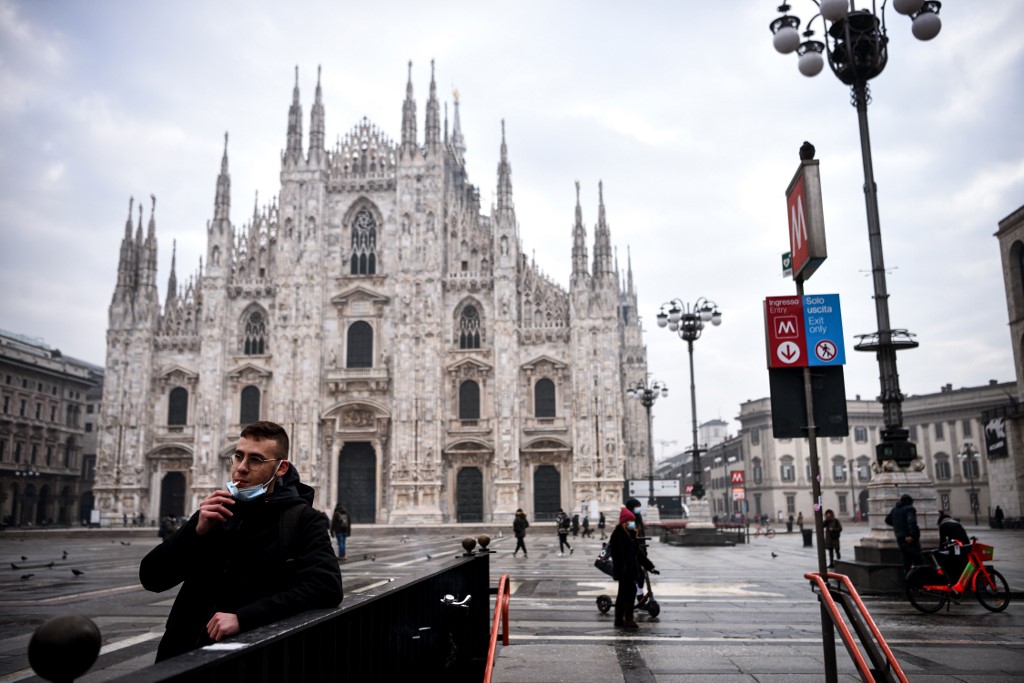'Freedom to smoke': What do people in Milan think of the city's new outdoor smoking ban?

A ban on smoking in many outdoor public places came into force in the Italian city of Milan on Tuesday. But some residents said they were not aware of the rules, or that it won't change their habits.
Italy's financial capital on Tuesday became the first city in the country to ban smoking in many open-air public places such as parks, stadiums, bus stops and cemeteries.
There are exemptions for lighting up in isolated spots, at a distance of 10 metres or more from other people - as well as for electronic cigarettes.
The smoking ban is intended to "reduce PM10 fine particles, which are harmful to the lungs, and protect the health of citizens against active and passive smoking in public places," according to the city council.
READ ALSO: These are the 55 most polluted towns in Italy
Situated in the middle of the industrial Po Valley and choked with road traffic, Milan regularly breaks air quality records - and eight percent of the PM10 particles in the city are due to smoking.
Fines for breaking the new law range from 40 to 240 euros - although they will be only gradually introduced.
By January 1st 2025, however, Milan plans to have a total ban on smoking in the open air.
"It's about time they passed this law. We're fed up with this smoke!" declared Massimo Gabbiadini, a shopkeeper in Piazza del Duomo, on Tuesday, "But I will wait and see if the rules are enforced."
"In the north of Europe people respect the law, but in Italy?" 54-year-old Gabbiadini told AFP.
The usual throngs of tourists outside Milan's cathedral were absent on Tuesday because of coronavirus restrictions, and most passers-by were local residents on their way to work.

Photo: Piero Cruciatti/AFP
Milan and the surrounding Lombardy region is currently a red zone due to the local level of contagion risk, which means a ban on movement even within your own town except for essential reasons.
Among those walking past the police officers standing guard, many with cigarettes between their lips seemed unaware of the change in the law.
"There's no sign saying you can't smoke in certain places," complained Floris Dethmers, an 18-year-old model in Milan for men's fashion week.
"I understand that it's banned inside. But outside, I want the freedom to smoke."
21-year-old Laura Beraldo said she's not ready to give up her 20-a-day habit, whatever the rules.
"I don't blame cigarettes for the smog, but the traffic and global warming," she said.
For now "there are no restrictions on the freedom to smoke, as long as I respect the 10-metre rule.”
Some smokers welcomed the ban, such as Maria Luigia di Toma, an unemployed receptionist.
"I think it's fair, because smoking is really annoying for people around you," the 63-year-old said.
Italy was a pioneer in Europe in banning smoking in closed public spaces, notably bars and restaurants, in 2005 - and such prohibitions are now widespread.
It has had an impact. Since 2005, the number of smokers aged 15 and over in Italy has fallen by one million to 11.6 million, according to a study by the ISS health agency.
However the country's smoking laws today are more lax than in some other countries, and there are frequent calls to extend the bans on smoking to restaurant terraces, beaches, and other outdoor public areas.
Milan is so far the only Italian city to have a ban on smoking in outdoor public areas.
In Florence, the city council also plans to introduce a ban on smoking "in public parks, gardens and in other places that are usually crowded and where youngsters gather" by June 2021.
Other Italian cities including Verona and Bolzano already outlaw smoking in public parks – though not on the streets – while Venice has proposed making parts of its historic centre no-smoking zones (without passing any legislation to date).
Comments
See Also
Italy's financial capital on Tuesday became the first city in the country to ban smoking in many open-air public places such as parks, stadiums, bus stops and cemeteries.
There are exemptions for lighting up in isolated spots, at a distance of 10 metres or more from other people - as well as for electronic cigarettes.
The smoking ban is intended to "reduce PM10 fine particles, which are harmful to the lungs, and protect the health of citizens against active and passive smoking in public places," according to the city council.
READ ALSO: These are the 55 most polluted towns in Italy
Situated in the middle of the industrial Po Valley and choked with road traffic, Milan regularly breaks air quality records - and eight percent of the PM10 particles in the city are due to smoking.
Fines for breaking the new law range from 40 to 240 euros - although they will be only gradually introduced.
By January 1st 2025, however, Milan plans to have a total ban on smoking in the open air.
"It's about time they passed this law. We're fed up with this smoke!" declared Massimo Gabbiadini, a shopkeeper in Piazza del Duomo, on Tuesday, "But I will wait and see if the rules are enforced."
"In the north of Europe people respect the law, but in Italy?" 54-year-old Gabbiadini told AFP.
The usual throngs of tourists outside Milan's cathedral were absent on Tuesday because of coronavirus restrictions, and most passers-by were local residents on their way to work.

Photo: Piero Cruciatti/AFP
Milan and the surrounding Lombardy region is currently a red zone due to the local level of contagion risk, which means a ban on movement even within your own town except for essential reasons.
Among those walking past the police officers standing guard, many with cigarettes between their lips seemed unaware of the change in the law.
"There's no sign saying you can't smoke in certain places," complained Floris Dethmers, an 18-year-old model in Milan for men's fashion week.
"I understand that it's banned inside. But outside, I want the freedom to smoke."
21-year-old Laura Beraldo said she's not ready to give up her 20-a-day habit, whatever the rules.
"I don't blame cigarettes for the smog, but the traffic and global warming," she said.
For now "there are no restrictions on the freedom to smoke, as long as I respect the 10-metre rule.”
Some smokers welcomed the ban, such as Maria Luigia di Toma, an unemployed receptionist.
"I think it's fair, because smoking is really annoying for people around you," the 63-year-old said.
Italy was a pioneer in Europe in banning smoking in closed public spaces, notably bars and restaurants, in 2005 - and such prohibitions are now widespread.
It has had an impact. Since 2005, the number of smokers aged 15 and over in Italy has fallen by one million to 11.6 million, according to a study by the ISS health agency.
However the country's smoking laws today are more lax than in some other countries, and there are frequent calls to extend the bans on smoking to restaurant terraces, beaches, and other outdoor public areas.
Join the conversation in our comments section below. Share your own views and experience and if you have a question or suggestion for our journalists then email us at [email protected].
Please keep comments civil, constructive and on topic – and make sure to read our terms of use before getting involved.
Please log in here to leave a comment.